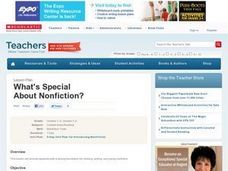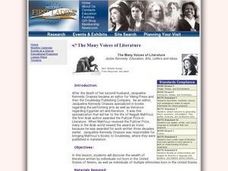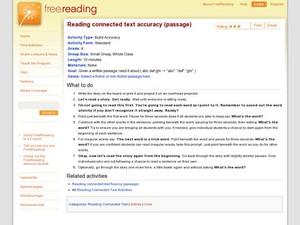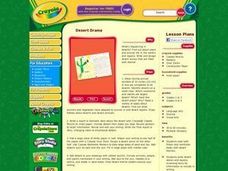Curated OER
What's Special About Nonfiction?
Students examine the difference between nonfiction and fictional writing. They identify the characteristics of nonfiction literature and examine how a nonfiction textbook organizes information.
The New York Times
Fiction or Nonfiction? Considering the Common Core's Emphasis on Informational Text
Nothing aids in comprehension more than an explanation and understanding of why things are done. Address why the Common Core requires the reading percentages that it established and analyze how this affects your readers. Learners read...
Curated OER
Comparing Fiction and Nonfiction
Fifth graders compare and contrast an informational article with a fictional story. They read the story "The Contest" as a class, and discuss the different types of literature genres. Next, they complete a vocabulary worksheet and a...
National First Ladies' Library
The Many Voices of Literature
Students discover the wealth of literature written by individuals not born in the United States. They discover the literature of individuals of multiple ethnicities born in the United States. Students compile a list of books they would...
Curated OER
Discovering Ourselves in Literature and Life
Students read literature and view other media to discover how print and non-print texts answer the thematic question: Who am I? students compare the ways ideas are presented, and create their own portfolios or personal Web pages...
Curated OER
Kumeyaay Indians
Useful for literary analysis, citing textual evidence, or summary skills, this lesson about the Kumeyaay Indians would be a good addition to your language arts class. Middle schoolers read novels and summarize the literature in their own...
Curated OER
Non-Fiction Text Features
Distinguish between textual features of non-fiction in the book The Lewis and Clark Expedition and in the non-fiction story "Ta-Na-e-Ka." Third graders create posters and participate in group discussions to show their understanding of...
Curated OER
Coming of Age Readings: Experiences in Korea and by Asians in America
Bring multi-cultural experiences and literature into your language arts class with this lesson. Here, young readers explore the points of view of first and second-generation Asian immigrants with a list of various fiction and nonfiction...
Curated OER
Reading Connected Text Accuracy (Passage)
Use some of these 80-word passages to practice reading fluency with your beginners. Project the text so all learners can see it, pointing to each word as scholars recite them one at a time. Warn readers of irregularly spelled words by...
Curated OER
Introduce Vocabulary: Clouds (Bauer)
What type of cloud is that? Explore meteorological vocabulary using Marion Bauer's book, Clouds (although these strategies could be used for any fiction or nonfiction text). Pre-teach the new words before reading the story aloud....
Curated OER
Introduce Vocabulary: Cross a Bridge (Hunter)
What does suspension mean? Learn this and other bridge-related vocabulary as scholars listen to Ryan Ann Hunter's nonfiction book, Cross a Bridge. This strategy can be applied to any book. Before reading, acquaint pupils with the new...
Curated OER
Introduce Vocabulary: Firefighters (Mitten)
Your budding readers know what it's like to get to a word and think, "What does that mean?" Expand their vocabulary in context using Christopher Mitten's nonfiction picture book Firefighters. Get them ready by pre-teaching the new words...
Curated OER
Comprehension Skills: Evaluate Using Fiction Stories and Aesop's Fables
Primary readers investigate several comprehension skills in the ten lessons of this unit. Forming opinions about stories, comparing stories to each other, using Venn Diagrams, and applying the ideas from a story to real life situations...
Curated OER
Desert Drama
Students read both fiction and nonfiction books with desert themes. Then they write desert stories and reports, reviewing texts for information to include in writing. Students also design desert scenes with details and setting elements...
Curated OER
Comprehension Strategy Instruction: Questioning
Providing learners with a solid armory of reading strategies is a good way to help them build better reading comprehension. The teacher will model how to use a questioning checklist to better understand what she is reading. Pupils will...
Curated OER
Introduce Vocabulary: Owen and Mzee: The True Story of a Remarkable Friendship (Hatkoff & Kahumbu)
The heartfelt true story of Owen the hippopotamus and Mzee the 133-year-old tortoise will have budding readers engaged as they practice vocabulary in the context of Isabella Hatkoff's nonfiction story. Although you could include more,...
Curated OER
Text Elements of Fiction and Nonfiction
Second graders examine the text elements associated with fiction and nonfiction texts. In this text elements instructional activity, 2nd graders listen to Anansi and the Moss Covered Rock by Eric A. Kimmel. They take formative...
Maryland Department of Education
The Concept of Diversity in World Literature Lesson 8: Nonfiction Close Reading
As part of their study of Things Fall Apart, class members conduct a close reading of a section of Chinua Achebe's essay, "An Image of Africa: Racism in Conrad's Heart of Darkness." Jigsaw groups then compare the voice in the essay...
K20 LEARN
Voices from the Past: History and Literature
Art can enhance the understanding of history. That's the big idea in a lesson that has young scholars read Randall Jarrell's poem "The Death of the Ball Turret Gunner" and an excerpt from John Hersey's Hiroshima, which provide a...
Utah Education Network (UEN)
Know Your Literature Genres
Open the library for young readers by introducing them to the main genres and sub-genres. A podcast and two presentations identify the characteristics of the different genres. Groups then sort through a box of books and, using evidence...
Curated OER
Writing Prompts for High School
Here’s a great teacher resource - thirty-five writing prompts designed for high school writers. Categories include cause and effect, definition, expository/informative, persuasive, how to, descriptive, narrative, biographical narrative,...
Curated OER
Determining Author's Point of View: The Sneeches
Determine the author's point of view in a text. Young readers read Dr. Seuss' The Sneeches and identify the author's purpose in the story. They identify persuasive techniques in writing, asking and answering questions to better...
Curated OER
Short and Sweet Science
Readers learn how to summarize scientific text and evaluate the advantages, disadvantages, and challenges in writing summaries. They select science-related articles you've pulled and collected from the New York Times and, with a partner,...
Curated OER
Creating and Presenting Haiku with Kid Pix
Third graders research what a Haiku is and be able to answer related questions on an example of a Haiku. They create an original Haiku of their own using general Haiku characteristic guidelines. Students use Kid Pix to type in and...

























